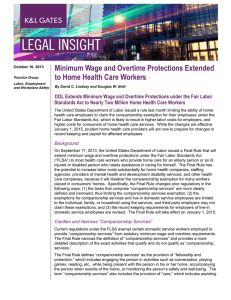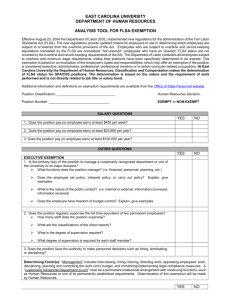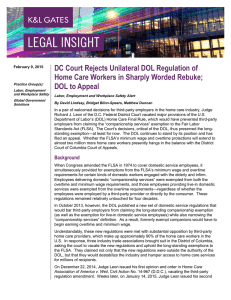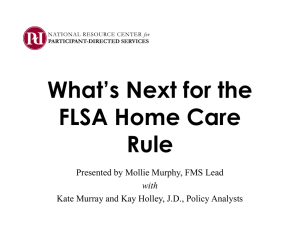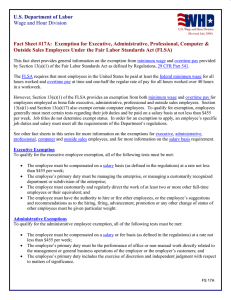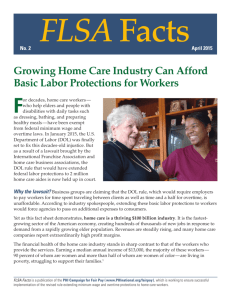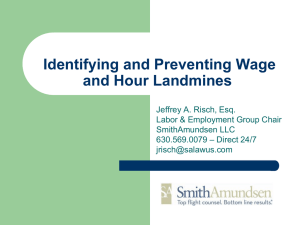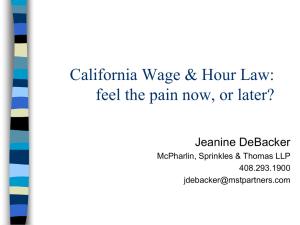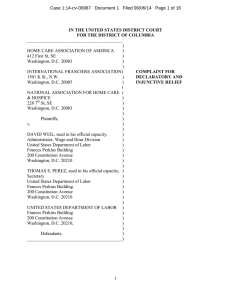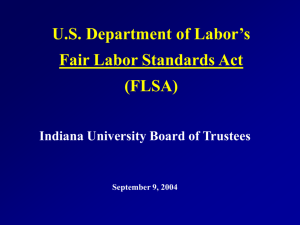Fair Labor Standards Act - Long Term Care Discussion Group
advertisement
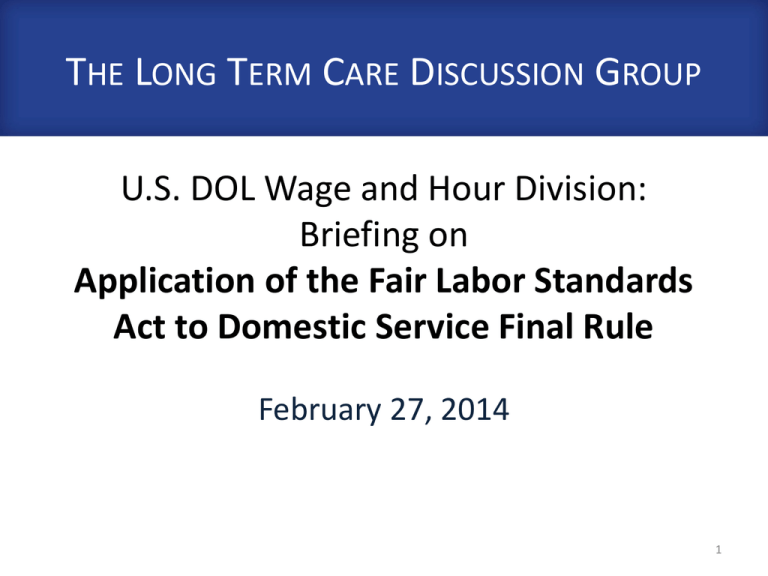
THE LONG TERM CARE DISCUSSION GROUP U.S. DOL Wage and Hour Division: Briefing on Application of the Fair Labor Standards Act to Domestic Service Final Rule February 27, 2014 1 Wage and Hour Division An Introduction Mission: • To promote and achieve compliance with labor standards to protect and enhance the welfare of the Nation’s workforce. • Laws administered by WHD (including the Fair Labor Standards Act) cover 135 million workers. 2 What is the FLSA? The Fair Labor Standards Act (FLSA) is the federal law that requires employers to pay employees minimum wage and overtime. 3 The FLSA & Domestic Workers 1974: Congress amended the FLSA • Extended minimum wage and overtime protections to domestic service employees • Exempted babysitters and workers who provide companionship services Since then: • Industry has evolved and grown, workforce has become more professionalized • Workers Congress intended to protect are excluded 4 FLSA Exemptions 1. “Companionship services” exemption – certain employees not protected by minimum wage and overtime pay requirements 2. “Live-in” domestic service exemption – certain employees not protected by overtime pay requirements 5 What Does the Final Rule do? • The Final Rule narrows the companionship exemption – consistent with 1974 amendments – to protect most direct care workers. • The Final Rule eliminates the companionship exemption for agency and third party employers, but preserves it for workers employed by families and individual who provide primarily fellowship and protection. • The Final Rule eliminates the live-in exemption from overtime for agency and third party employers, but preserves it for workers employed by families and individual who provide primarily fellowship and protection. 6 What are “companionship services” under the new Final Rule? “Companionship services” is defined as the provision of fellowship and protection. Includes the provision of care if the care is provided along with fellowship and protection and does not exceed 20% of total hours worked per person per workweek. Does not include domestic services provided primarily for benefit of other members of the household. Does not include medically related services. 7 Companionship services exemption: Who may claim it under the new Final Rule Excludes certain workers from minimum wage and overtime pay protections. Under the new rules: The consumer or the consumer’s family or household may claim this exemption (depends on employee’s job duties). Third party employers may not claim the exemption, regardless of the employee’s duties. 8 The live-in domestic service exemption: What is it? Excludes certain workers from overtime pay protections. A “live-in” domestic service employee resides in the private home where she works on a “permanent basis” or for “extended periods of time.” Note: Direct care workers who work 24-hour shifts are not necessarily live-in domestic service employees. 9 The live-in domestic service exemption: Who may claim it under the new Final Rule? Under the new rules: The consumer or the consumer’s family or household may claim this overtime pay exemption. Third party employers may not claim this exemption. 10 FLSA Principles That Haven’t Changed • Hours Worked How to determine when a worker must be paid for his/her time • Private Home How to determine if services are being provided in a private home, where the companionship services or live-in domestic service employee exemptions might apply • Paid Family and Household Care Providers Under what circumstances the scope of a direct care worker’s employment is limited because a family or household relationship also exists • Joint Employment How to determine whether an employee is in an employment relationship with more than one party for purposes of the FLSA 11 DOL Implementing Principles Expand wage protections for most of the direct care workers currently exempt from protections of the FLSA and thus not being paid travel time and/or minimum wage and overtime. Implement in a manner that ensures consumers and their families continue to have access to the critical community services on which they rely and that supports innovative models of care that help them live in the community. Revised Rules When do the new rules become effective? January 1, 2015 13 Dedicated Website dol.gov/whd/homecare 14 Dialogue 15
